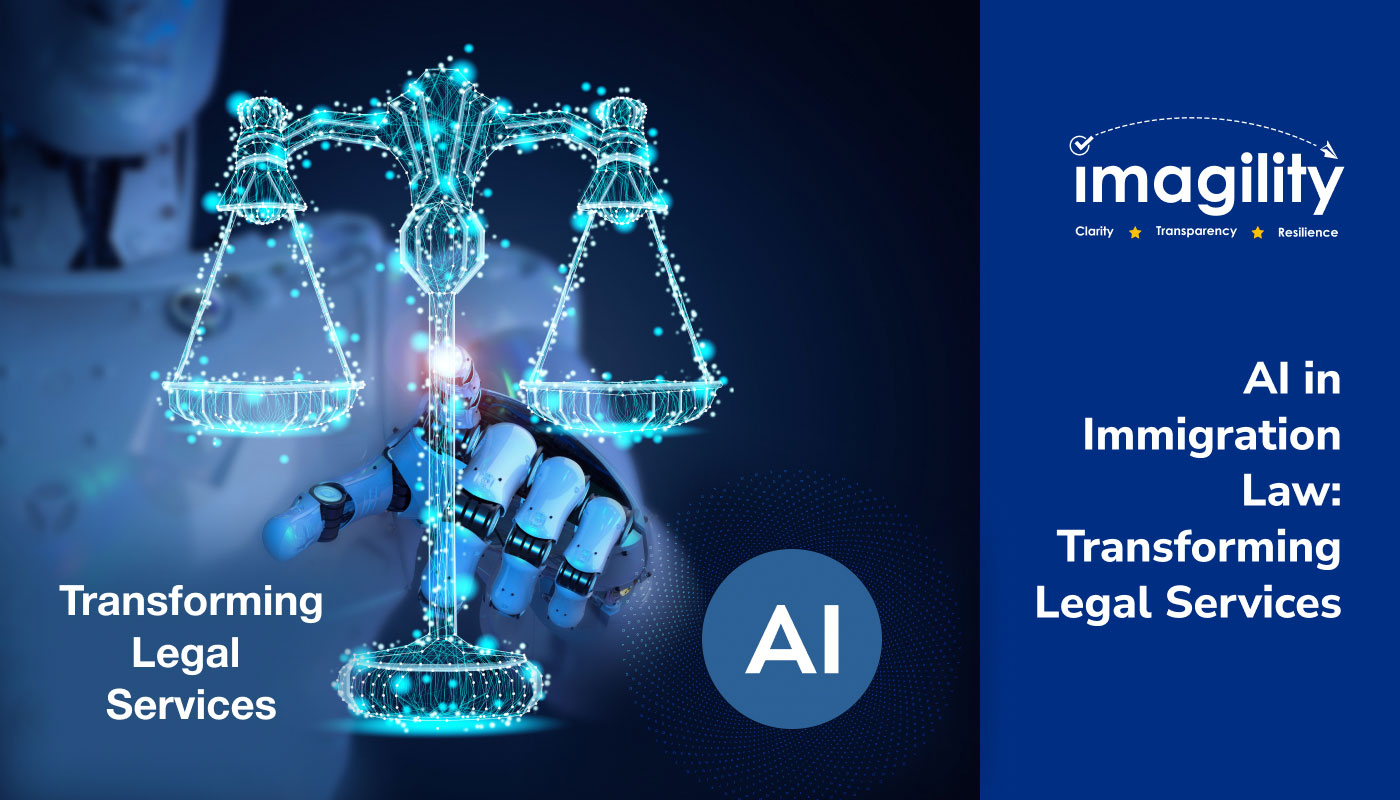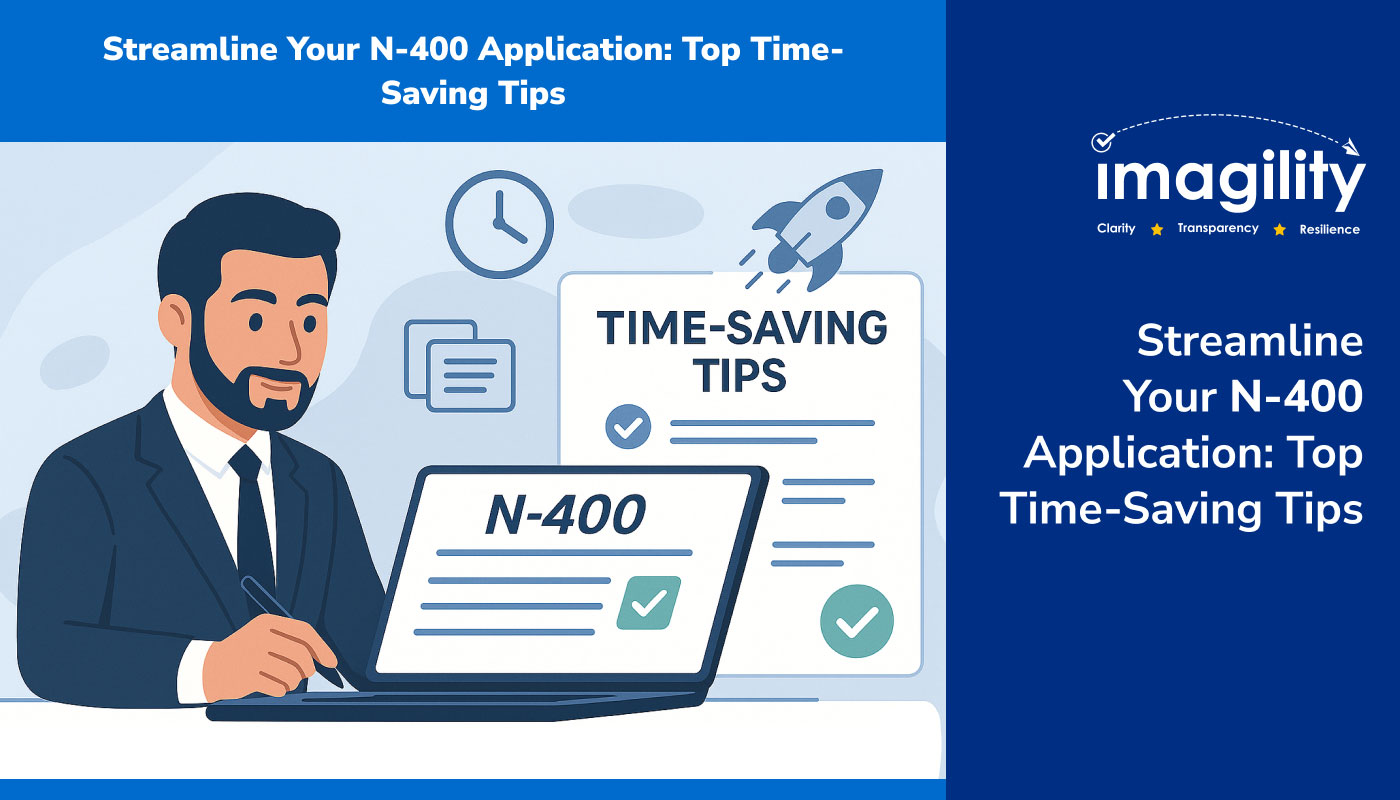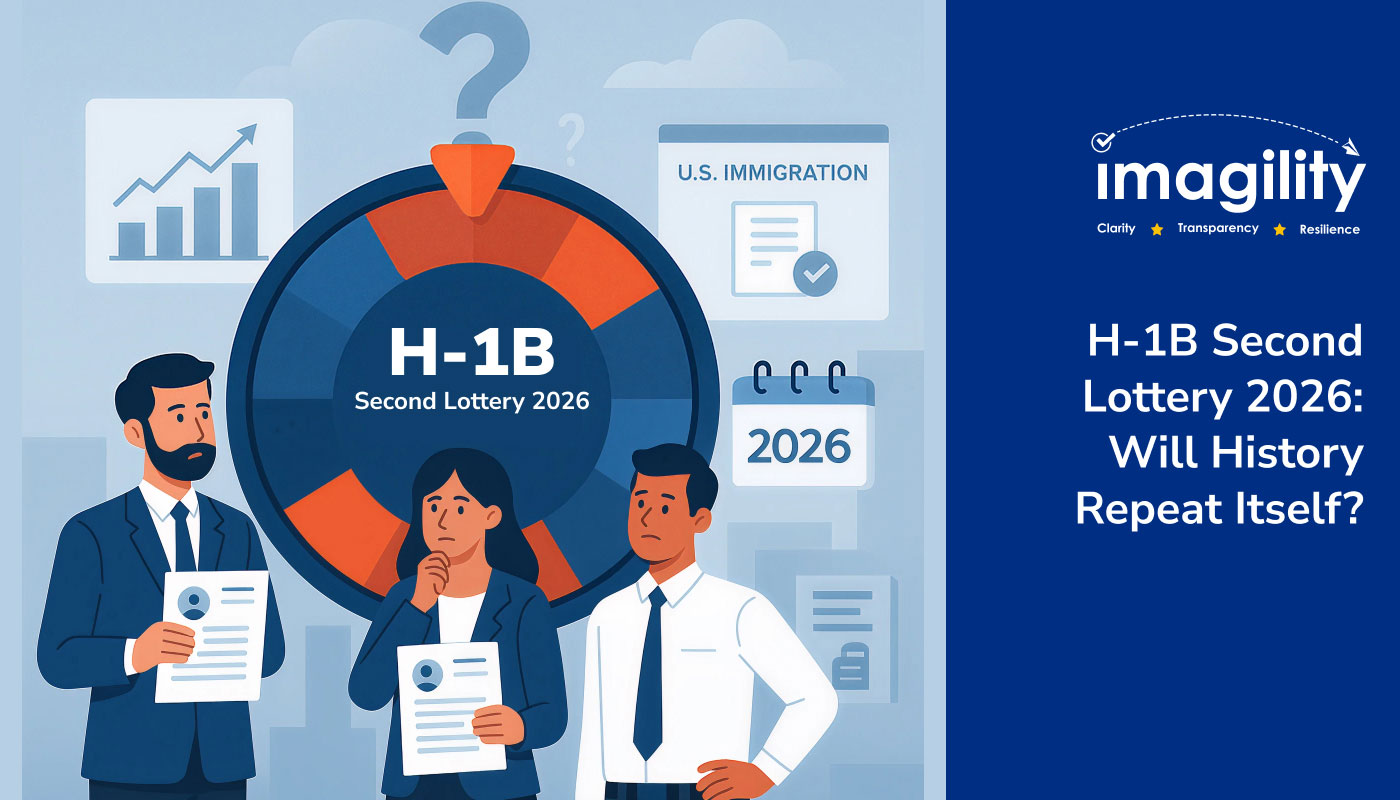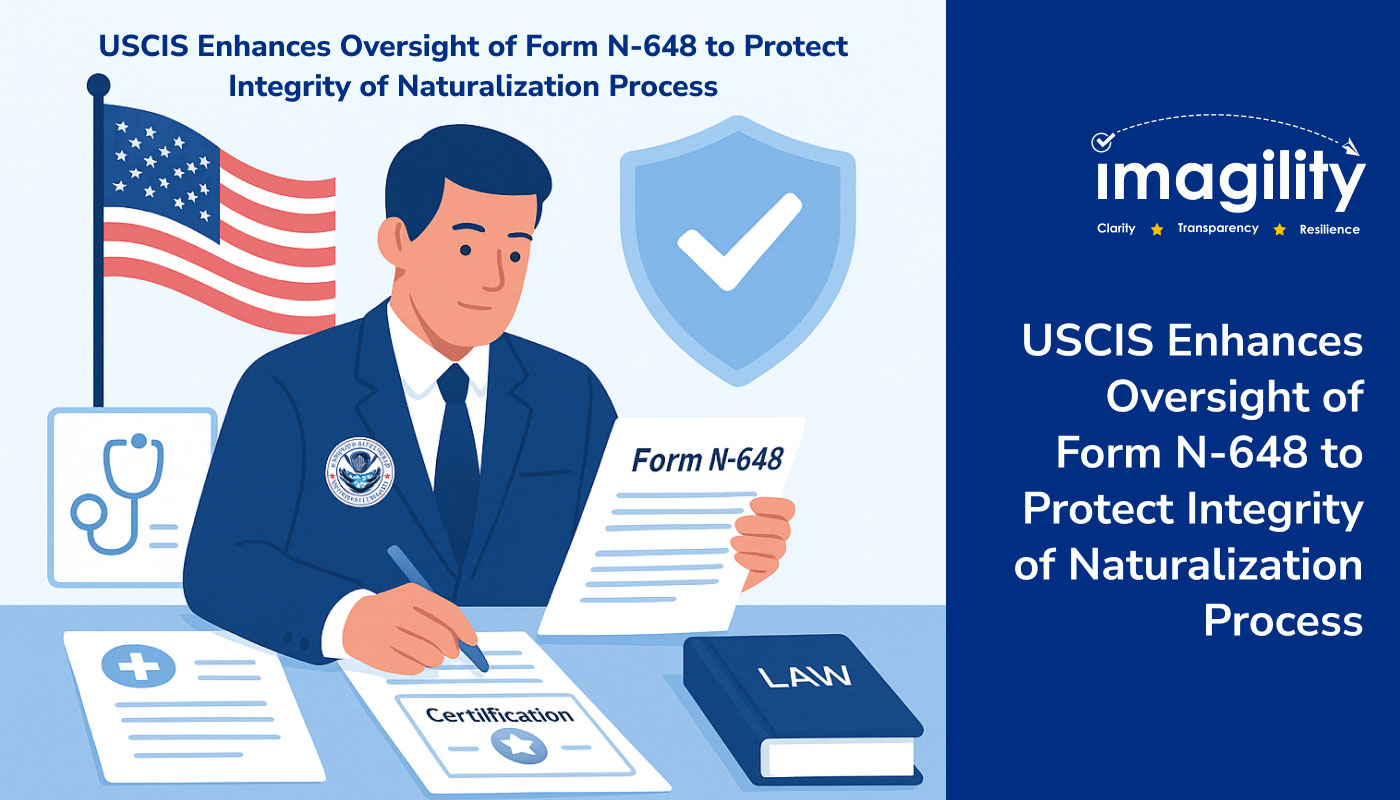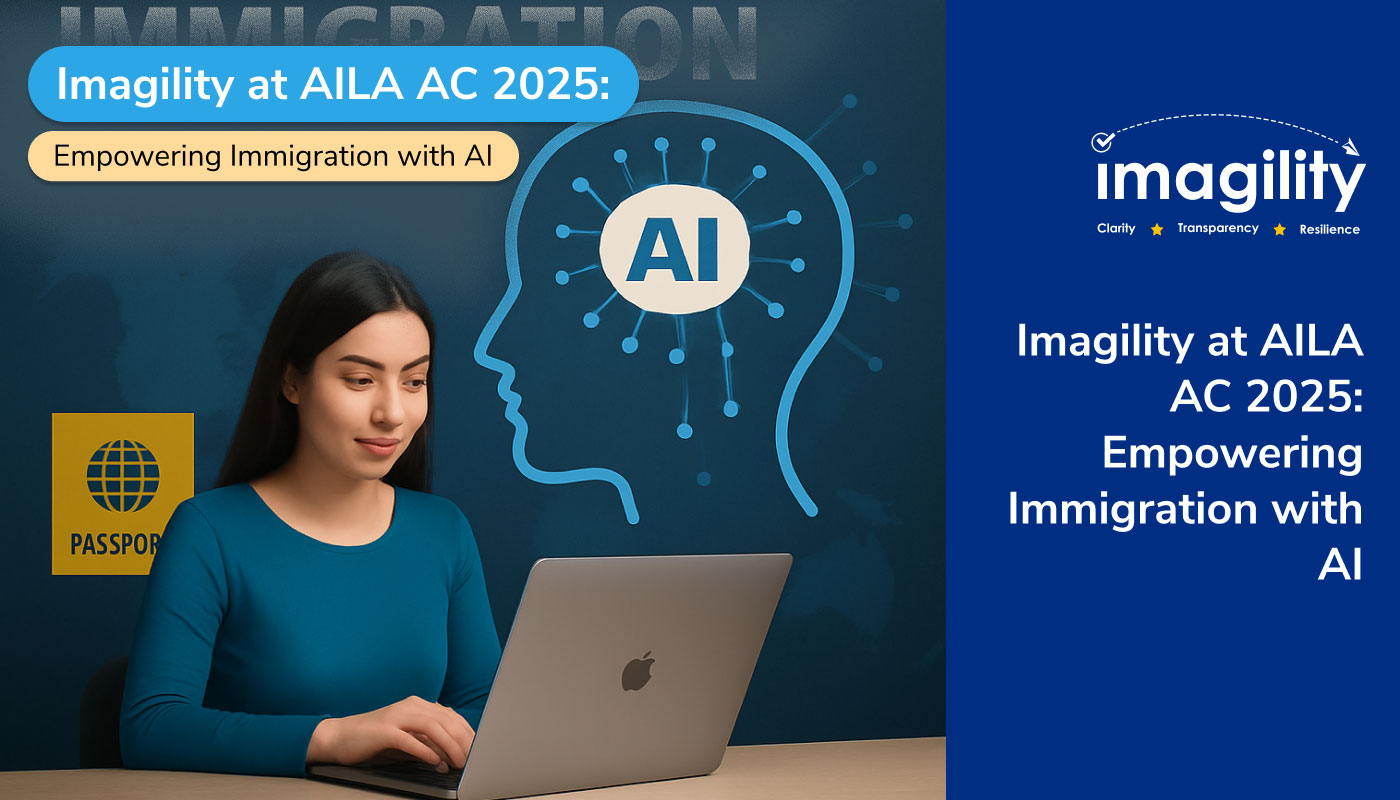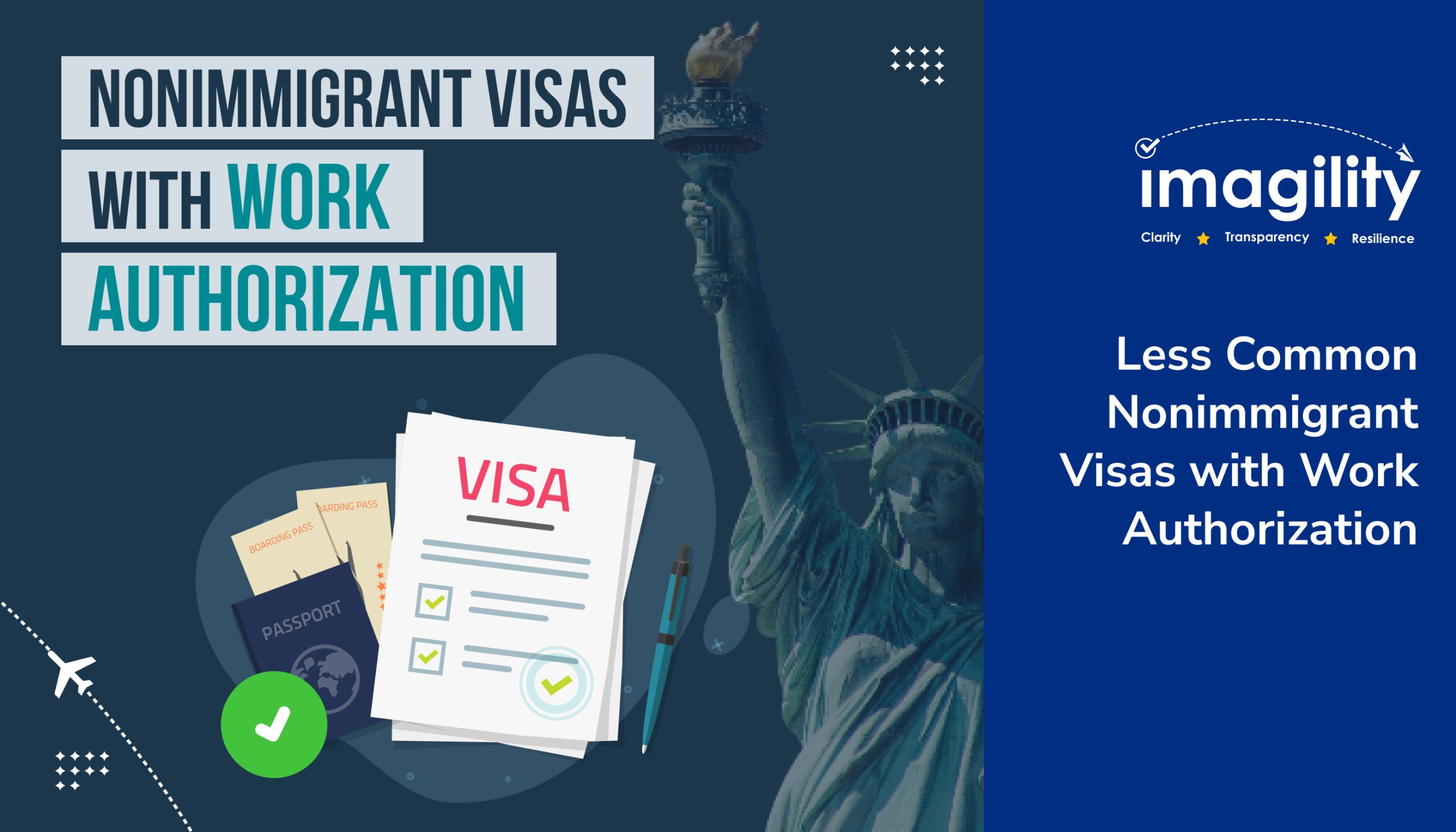Table of Contents
How AI Technology is Reshaping Immigration Law Practices
- Document Automation and Case Management
- Data Analysis for Improved Decision-Making
- Enhanced Due Diligence and Compliance
How is AI Beneficial for Immigration Attorneys?
- Improve Your Internal Processes
- Enhance Document Management
- Improve Your Legal Research
- Improve Your Risk Assessment
- Draft and Edit Legal Documents
- Improving Lawyer’s Lives
How is AI helpful in serving clients better?
Challenges and Limitations of AI in Immigration Law
Conclusion
About Imagility
AI has transformed almost every sector with its robust capabilities of automating tasks, reviewing them, and providing data-driven insights. Be it finance, healthcare, education, manufacturing, or telecom. AI has influenced each sector with its tremendous ability to push growth with increased ROI.
The immigration sector is no exception. AI is extending its influence in this domain, promising to revolutionize the industry for remarkable growth. Immigration attorneys are increasingly adopting AI technology to accomplish tasks efficiently and transparently.
In this blog, we will delve into the extraordinary potential of AI to revolutionize your legal services. We will also shed some light on how AI can help you meet and exceed your clients’ expectations.
How AI Technology is Reshaping Immigration Law Practices
AI technology is significantly reshaping the landscape of immigration law practices, offering innovative solutions to streamline processes, enhance efficiency, and improve overall effectiveness. The integration of artificial intelligence into the field of immigration law has brought about transformative changes, addressing various challenges and providing new opportunities for legal professionals, immigrants, and government agencies alike. Let’s take a closer look at how AI is shaping immigration law practices:
● Document Automation and Case Management
AI-driven tools enable immigration lawyers to automate the creation and management of legal documents. This includes the preparation of visa applications, petitions, and supporting documents. By leveraging natural language processing (NLP) and machine learning algorithms, AI systems can analyze vast amounts of legal text, helping lawyers ensure accuracy and compliance with ever-changing immigration laws.
● Data Analysis for Improved Decision-Making
AI technologies excel at processing and analyzing vast datasets, a capability that proves invaluable in immigration law. AI applications can assist legal professionals in reviewing case histories, identifying patterns, and predicting potential outcomes based on historical data. This data-driven approach enables lawyers to make more informed decisions and devise effective legal strategies.
● Enhanced Due Diligence and Compliance
Immigration laws are complex and subject to frequent updates. AI tools can aid lawyers in staying abreast of these changes by monitoring legal databases, government announcements, and policy updates in real-time. This ensures that legal professionals can provide accurate advice to clients, maintain compliance, and mitigate risks associated with changes in immigration regulations.
How is AI Beneficial for Immigration Attorneys?
AI proves highly beneficial for immigration attorneys, transforming various facets of their practice and significantly enhancing the overall efficiency, quality of service, and client experience. For instance, the optimization of internal processes. AI automates routine tasks, such as scheduling, deadline tracking, and basic client communications, allowing attorneys to allocate more time and expertise to complex aspects of their cases.
This not only streamlines workflows but also fosters a more agile and responsive legal practice capable of adapting to the dynamic nature of immigration law. Let’s look at the significant benefits that AI offers to immigration attorneys.
● Improve Your Internal Processes
In terms of internal processes, AI can revolutionize the way immigration law firms operate. By automating repetitive and time-consuming tasks, such as scheduling, deadlines tracking, and basic client communications, AI enables attorneys to streamline their workflows. This not only boosts efficiency but also allows legal professionals to allocate their time and expertise to more complex and strategic aspects of their cases. The result is a more agile and responsive practice that can better adapt to the dynamic nature of immigration law.
● Enhance Document Management
AI greatly enhances document management for immigration attorneys. Dealing with a vast array of legal documents is inherent to immigration law, and AI brings a transformative impact to this challenge. Advanced document management systems powered by AI can categorize, tag, and index documents with remarkable accuracy. This not only facilitates quick and precise retrieval of necessary information but also reduces the risk of oversights or errors.
Additionally, AI-driven document management systems often come equipped with powerful search functionalities, allowing attorneys to access specific details within large document repositories swiftly. This enhancement in document management contributes to a more organized, efficient, and secure legal practice, providing immigration attorneys with the tools they need to navigate the complexities of their field effectively.
● Improve Your Legal Research
AI plays a pivotal role in revolutionizing legal research for immigration attorneys. Traditional legal research can be time-consuming and labor-intensive, requiring extensive manual examination of cases, statutes, and regulations. AI-powered tools, on the other hand, can significantly expedite this process by swiftly analyzing vast databases and providing attorneys with relevant and up-to-date information. This not only saves valuable time but also enhances the quality of legal research by presenting comprehensive insights and precedents.
AI’s ability to process and understand intricate legal language allows immigration attorneys to stay abreast of the latest developments in immigration law, ensuring they have the most relevant and accurate information to support their cases.
● Improve Your Risk Assessment
AI contributes substantially to improving risk assessment in immigration law. By analyzing large datasets and identifying patterns, AI systems can assist attorneys in evaluating potential risks associated with specific cases. This includes predicting potential challenges, assessing the likelihood of success in various legal scenarios, and offering valuable insights that contribute to informed decision-making.
The predictive analytics capabilities of AI help immigration attorneys anticipate risks more accurately, enabling them to formulate strategies that mitigate challenges and enhance the overall success rate of their cases. This proactive approach to risk assessment is a valuable asset in the complex landscape of immigration law, where staying ahead of potential complications is crucial for providing effective legal representation.
● Draft and Edit Legal Documents
AI brings substantial benefits to immigration attorneys by significantly streamlining the process of drafting and editing legal documents. The automation capabilities of AI can assist attorneys in generating accurate and well-structured legal documents with increased efficiency.
By leveraging natural language processing and machine learning, AI systems can analyze vast amounts of legal content, ensuring consistency, adherence to legal standards, and the inclusion of relevant information. This not only saves valuable time for immigration attorneys but also minimizes the risk of errors and discrepancies in legal documents.
The ability of AI to understand legal language intricacies contributes to producing high-quality drafts, allowing attorneys to focus more on the strategic aspects of their cases rather than the manual details of document creation.
● Improving Lawyer’s Lives
AI plays a vital role in alleviating the stress levels of immigration attorneys. The legal profession is known for its demanding nature, with attorneys often facing tight deadlines and voluminous workloads. AI-powered tools can shoulder some of this burden by automating repetitive tasks, facilitating smoother workflows, and providing valuable support in various legal processes.
This not only enhances the overall efficiency of the legal practice but also allows immigration attorneys to allocate their time and energy to more complex and intellectually challenging aspects of their work. By reducing the administrative load, AI contributes to a more balanced and less stressful work environment for immigration attorneys, enabling them to deliver higher-quality legal services to their clients.
How is AI helpful in serving clients better?
AI proves immensely beneficial in enhancing the client experience in various ways within immigration law. AI significantly accelerates legal processes, ensuring faster case resolutions and improved turnaround times. By automating routine tasks such as document generation and information retrieval, immigration attorneys can provide swift and efficient services, meeting clients’ expectations for prompt legal assistance. Let’s dig deeper:
● Speed and Efficiency
AI introduces transformative advantages that significantly enhance the overall client experience by focusing on speed and efficiency. One of the primary benefits is the acceleration of various legal processes, resulting in faster case resolutions and improved turnaround times. AI automates repetitive tasks, such as document generation and information retrieval, allowing immigration attorneys to operate more swiftly.
This speed not only meets clients’ expectations for prompt legal services but also contributes to a more efficient and responsive legal practice. Clients benefit from streamlined processes, reduced waiting times, and an overall expedited legal service that aligns with the fast-paced nature of their immigration matters.
Explore the future of legal practice
Check out our infographics on Automating your law practice with Imagility Immigration Software!
● Enhanced Document Review
In addition to speed and efficiency, AI’s impact on document review is instrumental in elevating the quality of legal services. AI-powered document review systems can swiftly analyze extensive volumes of legal documentation, ensuring accuracy, completeness, and the identification of relevant information.
This advanced technology enhances the precision of legal research and aids immigration attorneys in building stronger cases. By minimizing the margin for error and oversight in document review, AI contributes to the delivery of more thorough and comprehensive legal services, ultimately benefiting clients seeking meticulous attention to detail in their immigration cases.
● 24/7 Accessibility
AI’s 24/7 accessibility brings a notable advantage to client service. Automation and AI tools enable continuous availability, allowing clients to access information, updates, and even basic legal advice outside traditional office hours. This around-the-clock accessibility ensures that clients can stay informed about their cases at their convenience, fostering a sense of transparency and responsiveness in the legal representation they receive.
The seamless integration of AI into client interactions not only meets the evolving expectations of a digitally connected world but also enhances the overall client experience by providing timely and accessible legal support.
Challenges and Limitations of AI in Immigration Law
As with any technological advancement, there are challenges and limitations associated with the use of artificial intelligence (AI) in immigration law. One major challenge is the potential for errors and biases in AI algorithms. These algorithms are trained on data, and if the data is biased or incomplete, it can lead to discriminatory outcomes in immigration decisions.
For example, if an AI algorithm is trained on historical data that reflects bias against certain nationalities or ethnicities, it may perpetuate that bias and result in unfair treatment of individuals from those groups.
Another limitation is the lack of human judgment and contextual understanding in AI. While AI can analyze data and provide insights, it may struggle to understand complex human emotions and circumstances. Immigration cases often involve personal and sensitive situations, and clients may require not only legal advice but also empathy and understanding. AI cannot provide the same level of human connection as a human lawyer, which may impact the overall client experience.
The reliance on AI in immigration law raises concerns about privacy and data security. Immigration cases involve highly personal and sensitive information that needs to be protected from unauthorized access or misuse.
Conclusion
The integration of AI into immigration law represents a groundbreaking shift that has the potential to reshape legal services dramatically. The transformative capabilities of AI, from document automation to enhanced client interactions, offer unprecedented advantages for immigration attorneys and their clients. By improving internal processes, streamlining document management, and revolutionizing legal research, AI enhances the efficiency and effectiveness of immigration law practices.
About Imagility
Imagility, a top-notch immigration software, encompasses these AI features, facilitating the automation of repetitive tasks, expediting petition creation, reviewing them, and suggesting powerful recommendations to increase visa outcomes. These benefits extend beyond the legal professionals to the clients, who experience faster case resolutions, meticulous document review, and 24/7 accessibility to legal support.
While AI significantly contributes to alleviating the stress levels of immigration attorneys and meeting the expectations of clients for speed and efficiency, it is essential to approach its integration with a balanced perspective.
In essence, the journey of AI in immigration law is a dynamic exploration of possibilities and challenges, requiring a thoughtful and responsible approach to harness its full potential while safeguarding the core values of the legal profession. As technology continues to advance, the collaboration between AI and legal practitioners holds the promise of not only transforming legal services but also shaping a more accessible, efficient, and client-centric future in immigration law.

